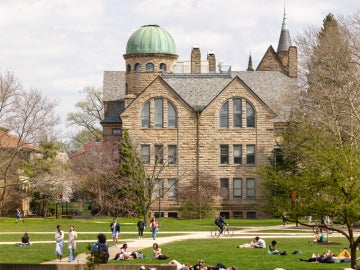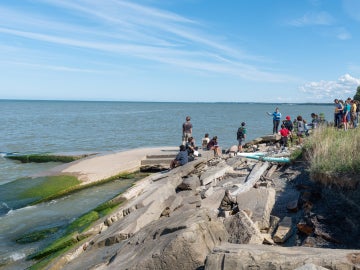A Conversation with KJ Cerankowski
January 11, 2018
Communications Staff

KJ Cerankowski, assistant professor of gender, sexuality, and feminist studies and comparative American studies
Photo credit: Jennifer Manna
KJ Cerankowski, assistant professor of gender, sexuality, and feminist studies (GSFS) and comparative American studies (CAS), discusses one pivotal experience in a feminist bookstore, asexuality, and the value of GSFS and CAS in a variety of careers.
What year did you begin teaching at Oberlin College?
I started at Oberlin in the fall of 2017.
What inspired you to pursue a career in gender, sexuality, and feminist studies?
I kind of had an “aha moment” that led me into gender and sexuality studies. After I graduated from college, I was living in Atlanta, Georgia, and was teaching elementary school. I loved teaching third grade, but I wasn’t sure that was what I wanted to do for my career. I had also been thinking about graduate school, but I wasn’t sure what I wanted to study. After school one day, I stopped in a feminist bookstore in Atlanta (one of the few surviving feminist bookstores in the United States) to purchase a book for a friend and mentor, who happens to be a professor of literature and gender studies. As I stood browsing the books, I caught myself writing down a bunch of titles in feminist and queer theory that I wanted to read. In that moment, it struck me that I should go to graduate school for gender and sexuality studies, and then I could read all this feminist and queer theory like it’s my job because it would be my job! So I called up my friend, gave her an anniversary print of The Nice Girl’s Guide to Good Behavior, and asked for her sage advice on the gender studies professor career path. And too many years later to name, here I am, living my dream.
Your research is about asexuality, trauma studies, queer theory, and transgender studies. On what are you focused in those areas?
I am particularly interested in how histories of trauma inform subjectivities. In other words, how does an individual’s experience with trauma inform their way of being in the world, especially in relation to gender and sexuality? For example, much of my work has focused on asexuality, most simply defined as a sexual orientation describing people who don’t experience sexual attraction. Asexual communities have made huge strides for asexual acceptance over the past ten years, but still, it is not uncommon for people to suggest that something must have “gone wrong” for someone who doesn’t want sex. Asexuals are commonly told that their asexuality must be a result of some type of sexual trauma or abuse, or that they must have a medical condition or hormonal imbalance. As a result, many people in the asexual community adamantly disavow any connection to trauma and insist that they were “born this way” and that trauma had nothing to do with their asexuality. In some instances, you see similar rhetoric deployed in transgender and lesbian and gay communities. In my work, however, I want to push the question of trauma and sexuality/gender. Setting aside causality, I ask how can we narrate trauma alongside what we might call non-normative sexualities and genders. How can we make space for all of those things in a life narrative? And how can we connect ideologies around gender and sexual normativity to collective and historical traumas, in addition to isolated individual trauma experience? These are the questions I am exploring in my current book project: how does childhood abuse inform how one approaches intimacy and gender transition as an adult; how does collective racialized trauma inform how we understand pain in the individual body and in the body politic; and how are we bound to repeat or grow into and around, rather than out of and over, in the timeline of trauma?
What courses are you teaching this year?
In the fall, I taught Intro to Comparative American Studies, which provides an overview of the field of American studies. Anyone who is interested in the field and wants a nice sample, or is considering a major or minor, should definitely take this course. I also taught Transgender Cultural Studies, which offers an in-depth look at what we might call “trans culture,” all the while interrogating what we mean by “trans culture.” We look at everything from webcomics, photography and painting, poetry, film, novels, and memoir. By the end of the semester, the students add to our digital archive of trans culture. In the spring, I will be teaching a writing advanced seminar called Sexual “Absences.” We’ll be working toward a research project that employs absence as a methodology. In other words, students will examine the history of sexuality through what might traditionally be defined as absences—celibacy, asexuality, virginity, chastity—and they will be interrogating the notion of absence as they approach queer or alternative intimacies and relationalities. Next year, I'm really looking forward to teaching one of my favorite courses on queer trauma narratives that will examine the overlaps of trauma theory and queer theory, as well as Intro to Queer Studies, which will serve as an introduction to queer theory and queer cultural studies.
What are some possible career paths for students who pursue a major in comparative American studies and gender, sexuality, and feminist studies?
Both majors open up so many career possibilities. I have had students go on to work for nonprofits and NGOs, especially those focused on immigration rights, reproductive health, and racial justice. Many students also often continue on to law school, medical school, or PhD programs en route to careers as lawyers, doctors, or college professors. Students may also work as content writers or as consultants, specifically on issues tackling corporate diversity. We’re living in a digital era where there is so much value placed on coding skills, but many tech companies are also hiring people with critical thinking and writing skills to work on more than code. A major in CAS or GSFS helps students build those thinking and writing skills that prove valuable in so many careers.
You may also like…
Oberlin Launches Critical AI Studies Minor in Fall 2026
With a solid foundation in both science and the humanities, this minor ensures students to understand and be able to analyze the ethical, cultural, environmental, political, economic, technological, and labor effects of AI.
Research Roundup
Every day, Oberlin’s faculty and students produce scholarly work that uncovers new insights into how we understand the world, particularly in the areas of sustainability and the environment.
Longman Professor Emeritus of English and Creative Writing David Young Dies at 88
Longman Professor Emeritus of English and Creative Writing David Young died on Saturday, May 3. He was 88. An esteemed poet, translator, editor, and scholar, Young taught at Oberlin between 1961 and...


